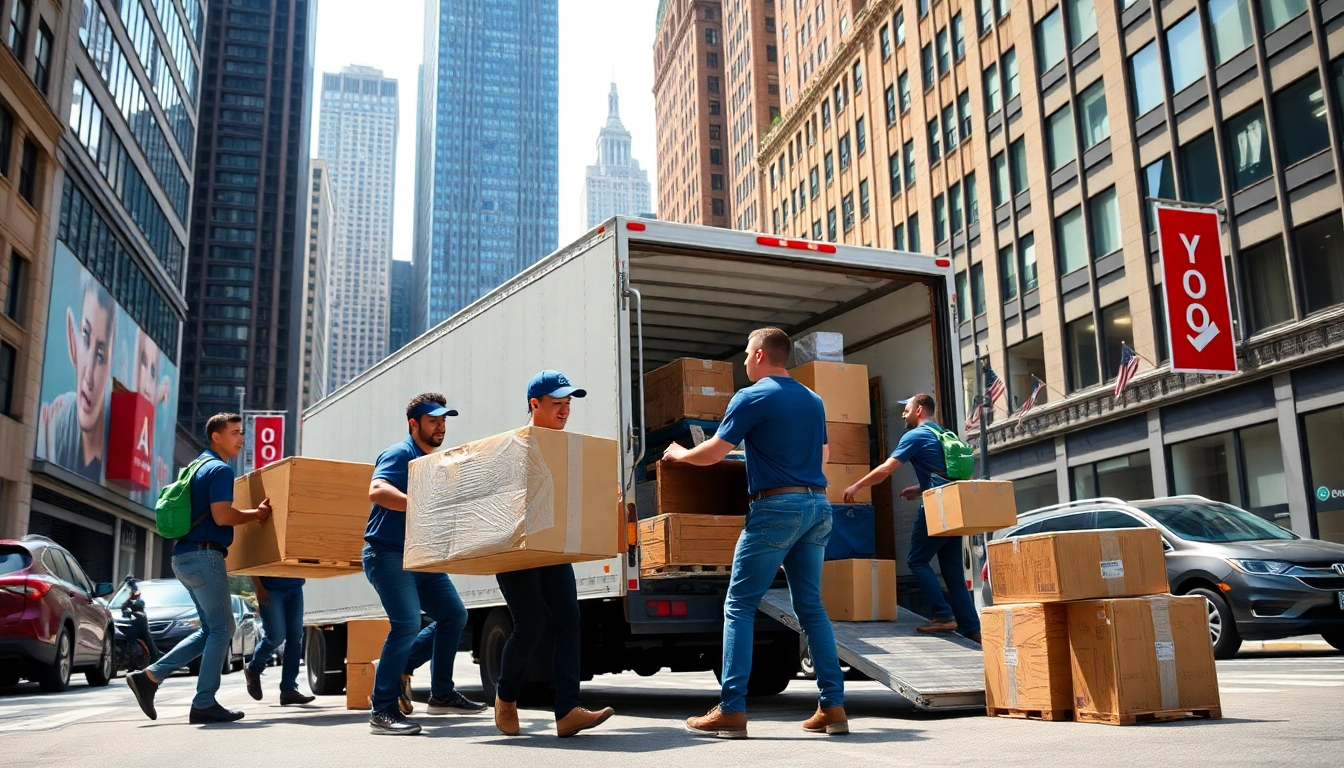Understanding the NYC Moving Landscape
Overview of Movers NYC
New York City, a bustling metropolis with a dynamic population, presents unique challenges and opportunities for those looking to relocate. With its array of neighborhoods, varying building styles, and a mix of cultures, finding the right movers nyc is essential to ensure a seamless transition. Many factors contribute to the moving experience in NYC, including the reliability of moving companies, the complexity of logistics, and the specific needs of each individual move.
Common Challenges in Urban Moving
Moving in an urban setting like New York City often involves navigating narrow streets, tight staircases, and specific building regulations that can complicate the moving process. Common challenges include:
- Limited Parking Options: Securing a parking spot for the moving truck can be difficult and may require permits.
- Narrow Streets and Alleyways: Some neighborhoods have challenging access points, leading to additional logistical considerations.
- High-Rise Buildings: Elevators may be limited, and moving items up multiple floors can be exhausting without the right tools and manpower.
- Weather Conditions: NYC weather can be unpredictable, impacting moving schedules and conditions.
How to Assess Moving Company Reputations
Choosing a reputable moving company is vital to a successful move. To find the best movers in NYC, consider the following steps:
- Read Reviews: Check platforms like Yelp, Google, and the Better Business Bureau for customer feedback.
- Ask for Recommendations: Speak to friends or colleagues who have recently moved for their insights.
- Verify Credentials: Ensure that the moving company is licensed and insured. This protects you in case of damages or issues during the move.
- Request In-Home Estimates: A reputable company will provide a detailed quote after evaluating your belongings in person.
Types of Moving Services Available in NYC
Residential vs. Commercial Moving Services
Understanding the differences between residential and commercial moving services is crucial when selecting the right option for your needs. Here’s a breakdown:
- Residential Moves: These involve relocating households and can include apartments, condos, and private homes. They often require more planning, especially when dealing with fragile items, personal belongings, and special requests.
- Commercial Moves: These are typically more complex and may involve relocating businesses, offices, or large facilities. Commercial movers more often encounter bulk equipment, office furniture, and technology infrastructure, so they must be equipped to handle these unique requirements.
Specialized Moving Services: Pianos, Artwork, and Heavy Items
Some moves necessitate specialized services due to the nature of the items being relocated. Categories include:
- Piano Moving: Moving pianos requires specialized equipment and skilled movers who understand how to transport them safely.
- Artwork and Antiques: High-value items like art and antiques need careful handling to prevent damage, often requiring custom packing techniques.
- Heavy and Bulky Items: Furniture, gym equipment, and appliances can be difficult to move and may require additional manpower or equipment like dollies and lifts.
Short-Term and Long-Term Storage Options
Many moving companies in NYC also offer storage solutions, which can be incredibly useful for residents during transition periods. Here are some options to consider:
- Short-Term Storage: Ideal for those needing to store items for a few days or weeks while awaiting their home to be ready.
- Long-Term Storage: Perfect for belongings that you don’t need immediate access to, such as seasonal items or infrequently used possessions.
- Climate-Controlled Storage: If you have items that require specific temperature or humidity conditions, some facilities provide climate-controlled units.
Estimating Moving Costs in NYC
Factors Impacting Your Moving Quote
The cost of moving in NYC can vary significantly, driven by several factors:
- Distance: Longer distances will naturally increase transportation charges.
- Volume of Items: More possessions mean more labor and truck space, leading to higher costs.
- Accessibility: Difficulty in accessing your home can add to the cost if additional equipment or labor is required.
- Time of Year: Peak moving season (May to September) can escalate rates due to demand.
How to Get Accurate Moving Estimates
To ensure that you receive accurate moving estimates, follow these steps:
- Provide Detailed Inventory: Be as detailed as possible about the items you’re moving to help companies give precise quotes.
- Schedule In-Home Evaluations: Many reliable companies will make the effort to visit your home and assess what needs to be moved.
- Discuss Timing: Inform movers if you need your items at a specific time, as this can affect availability and pricing.
- Request Written Estimates: Always ask for a formal quote in writing that outlines all costs and services included.
Understanding Hidden Fees and Costs
During a move, it’s vital to be cognizant of potential hidden fees that might affect your budget:
- Fuel Fees: Some companies charge for gas based on distance traveled.
- Stair Fees: Extra charges may apply if movers have to navigate multiple flights of stairs.
- Assembly/Disassembly Fees: Costs may arise if movers need to take apart furniture or appliances.
- Storage Fees: If your move gets delayed and you require storage, additional charges can accrue.
Best Practices for Packing and Preparing for Your Move
Efficient Packing Techniques for Movers NYC
Adopting effective packing techniques can simplify the moving process significantly. Here are several best practices:
- Start Early: Begin the packing process well ahead of your move date to avoid last-minute chaos.
- Label Boxes: Clearly label boxes by room and item contents for easier unpacking.
- Use Quality Supplies: Invest in sturdy boxes, packing tape, and protective materials to safeguard your items during transit.
- Pack Strategically: Place heavier items at the bottom of boxes and lighter items on top to prevent damage.
Essential Packing Supplies and Materials
Having the right supplies on hand is essential for a successful packing endeavor. Key materials include:
- Boxes in Various Sizes: Gather a mix of small, medium, and large boxes to fit different types of items.
- Bubble Wrap and Packing Peanuts: Protect fragile items using cushioning materials.
- Moving Blankets: Invest in moving blankets to safeguard large furniture pieces.
- Markers for Labeling: Use permanent markers to write on boxes for clear identification.
How to Prepare Furniture and Appliances for Transport
Preparing large items for transport is critical to ensure they arrive safely at your new location. Consider the following steps:
- Disassemble Furniture: Break down large pieces whenever possible to make them easier to transport.
- Wrap Items Carefully: Use blankets, bubble wrap, or plastic wrap to cover furniture and appliances thoroughly.
- Secure Appliances: Ensure that fridges, washers, or ovens are secure and emptied before the move.
Finding the Right Movers NYC for Your Needs
Evaluating Customer Reviews and Testimonials
When searching for movers in NYC, customer feedback can be invaluable. Here’s how to effectively evaluate reviews:
- Look for Patterns: Pay attention to recurring themes in reviews regarding service quality, timeliness, or pricing.
- Consider the Number of Reviews: A company with many reviews may provide a more accurate picture of their service.
- Look for Updated Reviews: Recent feedback can indicate whether a company has maintained its standards over time.
The Importance of Insurance and Licensing
Before committing to a moving company, ensure they possess the necessary insurance and licensing:
- Verify Licensing: Check for state licenses and regulatory compliance to avoid illegitimate operations.
- Ask About Insurance: Reliable moving companies should offer insurance options to cover potential losses or damages during the move.
- Understand Coverage Levels: Familiarize yourself with the types of coverage available – from basic liability to full valuation protection.
Finalizing Your Moving Plan: Contracts and Agreements
Once you’ve chosen a moving company, it’s crucial to finalize the details effectively. Here’s how:
- Review the Contract: Thoroughly read your moving contract, ensuring that all agreed-upon services and prices are detailed.
- Discuss Payment Options: Understand the payment structure and options (deposits, estimates, and final payments).
- Confirm Arrangements: Reconfirm your moving day details, including the time of arrival and any special requests you have.



